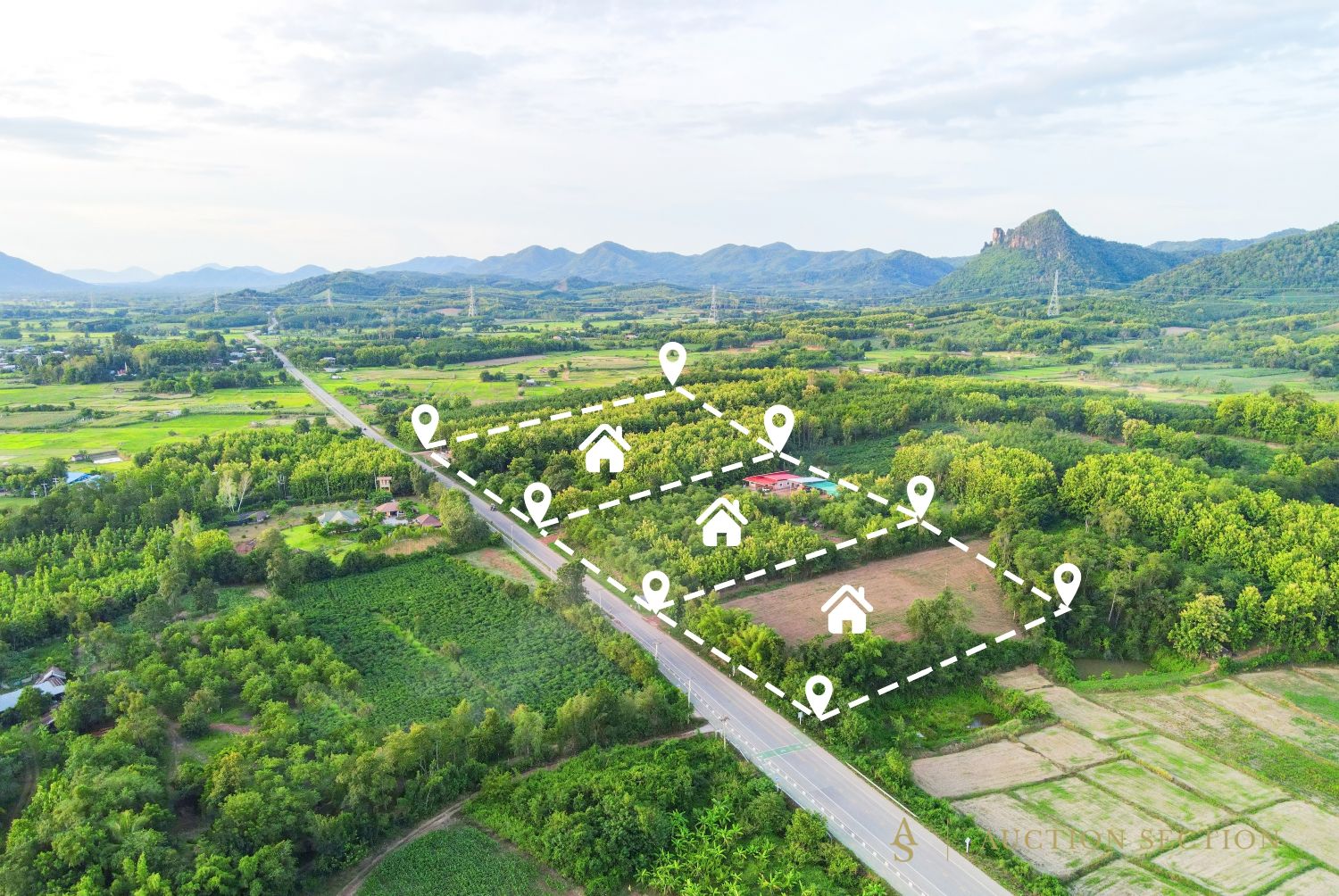
Selling land in Texas isn’t the same as selling a house, and treating them the same can cost you time and money.
Many first-time sellers assume it’s a simple process, but land comes with different buyers, legal needs, and pricing challenges. Are you confused about how to value vacant land? Are you unsure why your listing isn’t getting attention? Should I use an agent or an auction? You’re not alone.
In this guide, we break down the key differences between selling land and selling a home in Texas so you can avoid common mistakes and choose the right strategy for a faster, smarter sale.
Quick Differences Between Selling Land and Selling a House in Texas
| Aspect | Selling Land | Selling a House |
| Buyer Type | Investors, developers, farmers | Homeowners, families |
| Valuation Method | Based on location, zoning, access, and comps | Based on condition, square footage, and features |
| Time to Sell | Often 6–12 months (faster with auction) | Typically 2–3 months |
| Marketing Focus | Aerial photos, zoning, soil, utilities | Staging, curb appeal, and interior features |
| Sales Strategy | Often better through an auction | Usually listed via MLS and agents |
| Documentation Needed | Survey, zoning info, title, legal boundaries | Home inspection, disclosures, appraisal |
Key Differences Between Selling Land and Selling a Home in Texas
Selling land in Texas is a distinct process from selling a house, and understanding these differences is crucial if you want to avoid delays, attract the right buyers, and secure the best price.
Here’s how the two compare:
1- Vacant Land Has No Structure
Unlike houses, land doesn’t offer physical features like bedrooms or kitchens. There’s no curb appeal to the stage or furniture to clean. Instead, buyers look for potential: Is the land in a good location? Can it be developed? Does it have access to water, electricity, or roads? You need to sell the possibility, not a finished product, so maps, surveys, zoning info, and drone footage become your best tools.
2- Land Buyers Are Different from Home Buyers
Land attracts a very different kind of buyer. While homebuyers usually want a comfortable, move-in-ready space, land buyers are often investors, builders, ranchers, or developers. They think long-term, analyse numbers, and consider factors such as return on investment or development potential. They’re also more likely to pay in cash or through private financing rather than traditional home loans.
3- Land Sales Involve Zoning, Permits, and Usage Rights
A home is already built and zoned for residential use—buyers know what they’re getting. With land, it’s not that simple. Buyers need to verify if the land is zoned for their intended use, whether that’s residential, commercial, or agricultural. They must also check environmental restrictions, access roads, flood zones, and easements. If these details aren’t clear from the start, it can delay or kill a deal.
How Property Valuation Works | Land vs. House Sales
One of the biggest challenges sellers face is determining the accurate price of a piece of land. Unlike homes, land value depends heavily on potential, not condition.
- How to Compare Land Sales in Your Area (Comps): Use recent land sales in your zip code as a starting point, but ensure they have the same zoning, size, and utility access. Websites like Lands of Texas or Realtor.com can help, or consider getting a free evaluation from AuctionSection for local insights.
- Market Value vs. Tax Appraised Value in Texas: The county’s tax appraisal may differ significantly from the market value that buyers are willing to pay. Always prioritize real market demand over tax records when setting a price.
- How Utilities and Site Improvements Affect Land Value: Access to electricity, water, paved roads, or fencing can significantly increase land value. Bare land with no access may sit on the market longer or sell for less.
USDA research indicates that factors such as soil quality, water access, and proximity to urban areas significantly influence land values, even more so than size alone.
Marketing Land for Sale vs. Marketing a House
You can’t stage land the way you stage a home, but marketing is still critical.
- Use Drone Photos and Maps Instead of Room Staging: Since there’s no house to tour, use aerial views, lot boundaries, and access maps. Clear visuals help buyers picture future use.
- Highlight Zoning, Access, and Infrastructure in Land Ads: Buyers want to know what they can build, how to access the land, and whether it has utilities. Always list zoning info and nearby roads.
- Why Auctions Work Better for Land Listings: Land auctions attract serious, ready-to-act buyers. Unlike traditional listings that may sit for months, auctions create a sense of urgency and competition, resulting in faster sales and better value.
Land Sales Take Longer, But Not with the Right Strategy
Time-to-sale is one of the most significant differences in land vs. home selling.
- House Sales Average 60-90 Days in Texas: Thanks to MLS exposure and high demand, homes usually sell in 2-3 months.
- Land Sales Can Take 6-12 Months or More: As noted by the Texas A&M Real Estate Centre, land listings typically stay on the market longer than homes, as buyers require more time for due diligence and financing. Land listings without the proper marketing or poor pricing can sit idle for over a year.
- Land Auctions Often Close in 30-45 Days: AuctionSection’s land sales often close within 45 days, with pre-qualified buyers and clear timelines.
Legal Requirements for Selling Land vs. Selling a House in Texas
Land and home sales both require documentation, but land can require more preparation upfront.
- Why a Survey and Clear Boundaries Matter More for Land: Without structures, buyers rely on lot lines and surveys. A missing or outdated survey can delay closings or reduce trust.
- Zoning Laws, Easements, and Access Rights Explained: Ensure buyers are aware of any utility easements, water access rights, or zoning limitations that may affect their property. Transparency builds trust.
- Clearing Titles and Handling Liens on Vacant Land: A clear title is critical. Resolve any property tax issues, ownership disputes, or liens before listing or auctioning.
Who Typically Buys Land vs. Who Buys Homes in Texas?
Understanding your buyer helps you market better.
- Land Buyers Include Developers, Investors, and Ranchers: They want value, growth potential, and income-producing opportunities. Many pay cash or seek large parcels.
- Homebuyers Are Focused on Comfort and Move-In Ready Spaces: Homebuyers look for condition, layout, and amenities, with very different goals than land investors.
- Commercial Buyers vs. Residential Buyers: What They Look For. Commercial land buyers typically focus on road frontage, traffic count, and zoning, whereas residential land buyers often prioritise peaceful settings or access to a specific school district.
Why Land Auctions Work Better Than Traditional Listings
Land doesn’t always sell well on MLS or Zillow, but auctions can fill the gap.
- Auctions Attract Competitive, Motivated Buyers: Buyers attend auctions to make purchases, not browse. Bidding creates urgency and can drive higher offers.
- Market Exposure Is Faster and More Targeted: Auction companies like AuctionSection market directly to Texas land buyers, developers, investors, and farmers.
- Sales Close Faster, with Fewer Delays or Negotiations: Once bidding ends, there’s no haggling. Contracts and closings proceed on a clear timeline, typically 30-45 days.
Tips for Landowners Who Have Only Sold Homes Before
If this is your first time selling land, these tips will help.
- Don’t Rely on House Pricing Rules, Use Land Data Only: The market for land works differently. Focus on land comps, not home prices.
- Get a Property Survey and Highlight Site Features: Show off access roads, fencing, trees, water sources, or soil quality. The more info you share, the better.
- Consider Auctions for Faster, More Reliable Results: Land auctions are lower-stress, close more quickly, and often yield better returns. It’s a smart move, especially for sellers outside city centres.
Frequently Asked Questions
You can, but it’s better to use a land specialist or auction company. Most residential agents aren’t trained in land marketing.
Yes, unless you use an auction. Traditional land listings can take months, while auctions typically close within 45 days.
Yes. Homes have more comps and structure-based value. Land relies on zoning, location, and market trends.
Homes are emotional purchases. The land is logical, and buyers want value and flexibility. Auctions create competition, which suits land perfectly.
Sell Your Texas Property with the Right Strategy
Selling land is different from selling a house. You need to know the correct value, the right buyer type, and the proper marketing method. While homes may sell through the MLS, land often requires a focused, expert-driven approach, and real estate auctions are one of the best tools available.
Whether you’re selling rural acreage, commercial land, or inherited property, AuctionSection helps you move forward with confidence.
Get started with a free land valuation and custom strategy today at Auction Section Sell Smart. Sell fast. Sell Land in Texas with the Experts Who Know Texas Land Best.


